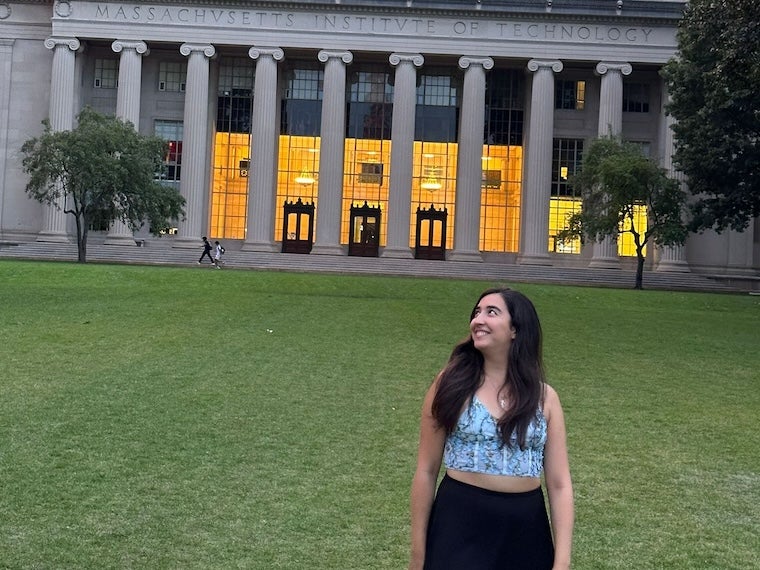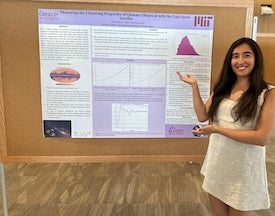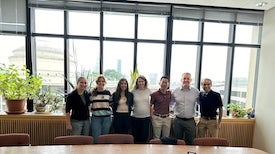Abby Tejera Rocha ’25 Had an Out-Of-This-World Summer
October 11, 2024
Communications Staff

Abby Tejera Rocha ’25 outside of an MIT building in Cambridge, MA.
Photo credit: courtesy of Abby Tejera Rocha ’25
Abby Tejera Rocha ’25 is a physics and computer science double major, with an astrophysics concentration here at Oberlin. This summer, she took her skills up to Massachusetts to do research at MIT. Here, she discusses what led her there, her innovative project, and where she plans to go next.
Describe what you’re doing this summer in your internship.

This summer I was doing research in the area of astrophysics at Massachusetts Institute of Technology (MIT), as part of the MIT Summer Research Program (MSRP). There, I’m a member of the research team called "Cosmic Dawn Group" led by Dr. Anna-Christina Eilers in the Physics Department at MIT.
As part of this team, my research focuses on measuring the clustering properties of quasars observed with the Gaia space satellite, in order to study the properties of the dark matter halos that host these luminous quasars across cosmic time. As a brief explanation, my research is mostly about quasars. Galaxies have super massive black holes at their center, and during the time that these grow by accreting matter, such as stars, dust, and gas from their surrounding environment, these galaxies are extremely luminous and we call them quasars. For this research I use data from the Gaia space mission, through the Quaia catalog, which is the largest collection of quasars to date.
This research work allows us to know more about objects in our universe such as quasars and the dark matter halos that host them, and allows us to learn about the clustering properties of these objects. In the future and through the data that can be calculated and found from this research, we will be able to understand on what timescales supermassive black holes form and grow.
How did Oberlin shape or influence you to pursue this internship?
Oberlin has opened the doors of knowledge and opportunities throughout my college experience. At Oberlin, I had my first research experience in my first year, when I joined Dr. Jillian Scudder’s lab in the Physics and Astronomy Department, doing research on metallicities in different nearby galaxies. This experience taught me about what it’s like to do research in an academic setting, and it made me realize that I want to continue my academic training in the astrophysics area and continue doing research. This also prepared me to apply to summer research opportunities. In addition, being a student in the STRONG Program (Science and Technology Research Opportunities for a New Generation) at Oberlin College prepared me to face the responsibilities and challenges that one can encounter in the process of doing science. During the summer of 2023 I had my first research experience outside of Oberlin, joining the LIGO Scientific Collaboration under the mentorship of Dr. Gabriela Gonzalez, doing research on gravitational waves. This team was awarded the 2017 Physics Nobel Prize for making the first detection of gravitational waves, proving Einstein’s General Relativity Theory. This research and networking opportunity led to this research team inviting me to continue my research with them which has allowed me to keep on learning from them. Now in the summer of 2024, I was selected to join the MIT Summer Research Program (MSRP), and do research in the Physics Department at MIT under the mentorship of Dr. Anna-Christina Eilers. This experience has been amazing and I’ve been able to continue developing my research skills.
The academic community of Oberlin, the Physics & Astronomy Department, and the Computer Science Department have prepared me and provided me with knowledge to be able to do research and successfully collaborate in teams, making me be able to participate in these experiences that have allowed me to keep on learning, gaining experience, networking, collaborating, and setting my goals for the future.
How does pursuing this internship align with your post-college life and career goals?

During this internship, I’ve been able to do research while also learning about graduate school. I believe that the early experiences and information students like me receive from experiences like this one are important in our motivation and training as future professionals. I want to pursue a PhD and contribute as a researcher while supporting other students that share this dream of becoming a scientist and researcher, in the same way that these great women that I have had the honor of having as mentors have supported me. I want to continue my academic training and work towards achieving greater inclusion, diversity, and equity in STEM, to shorten gaps and make a positive impact in society. As a student in the Bonner Scholars Program at Oberlin College, where I do community service, I’ve been able to learn that science has to be at others’ service to achieve developed and equitable societies.
How has the liberal arts education and way of thinking shaped how you approach science and research?
I consider that having a liberal arts education at Oberlin College has prepared me to look at things from different lenses, and this can be really helpful when doing research. When doing research, often we encounter more questions than answers, and our main job is to think of hypotheses and possible ways of finding the answers to our questions. In this process, being able to think of different solutions is key to having more chances of getting to the answer. In my case, I find myself combining my two majors a lot when doing research. I think of code I can write to help me analyze the astrophysical data I have, or tools I can use or develop to make my code faster or more efficient. I also consider that, thanks to having a liberal arts education, I have been able to keep practicing my science communication skills. These are key to making STEM accessible to everyone, and to achieving greater inclusion of minorities in these areas, while also shortening the gender gap in some of these areas, as there’s still lots of work to do towards these goals.
If you're interested in a summer internship, connect with the Career Exploration & Development team to learn more about exploring career interests, gaining real-world experience, and developing a professional network.
You may also like…
Nikki Keating ’25 earns Fulbright to teach English
The recent graduate will complete her teaching assistantship in Kenya.
From Oberlin research to Cleveland Clinic labs
Two young alumni tackle the fascinating challenges of brain cancer research.
Teamwork For the Win
Alexis Dill ’20 is using the communication skills she honed at Oberlin to promote the Worcester Red Sox.


